1 Thessalonians 4:13-5:11: The Situation and Paul's Response (Essay)
VerifiedAdded on 2023/01/13
|9
|3047
|43
Essay
AI Summary
This essay examines the context and purpose behind Paul's writing to the Thessalonians, specifically focusing on 1 Thessalonians 4:13-5:11. It explores the historical background of Thessalonica, highlighting its significance as a Roman city and the presence of a small Jewish community. The essay delves into the concerns of the Thessalonians regarding the Second Coming of Christ and the fate of those who had died. It analyzes Paul's response, emphasizing his teachings on the resurrection, the importance of living a moral life, and the hope offered to believers. The essay also touches upon Paul's interactions with figures like King Agrippa and Festus, shedding light on his character and his unwavering commitment to his faith. The essay concludes by summarizing Paul's key messages, including his emphasis on the unpredictable nature of Christ's return and the assurance that those who have died in faith will also be resurrected. Overall, the essay provides a comprehensive understanding of Paul's guidance and the situation that prompted his letter.

Essay Plan
Paraphrase This Document
Need a fresh take? Get an instant paraphrase of this document with our AI Paraphraser

TOPIC ..........................................................................................................................................................3
INTRODUCTION ...........................................................................................................................................3
MAIN BODY .................................................................................................................................................3
REFERNCES .................................................................................................................................................9
INTRODUCTION ...........................................................................................................................................3
MAIN BODY .................................................................................................................................................3
REFERNCES .................................................................................................................................................9
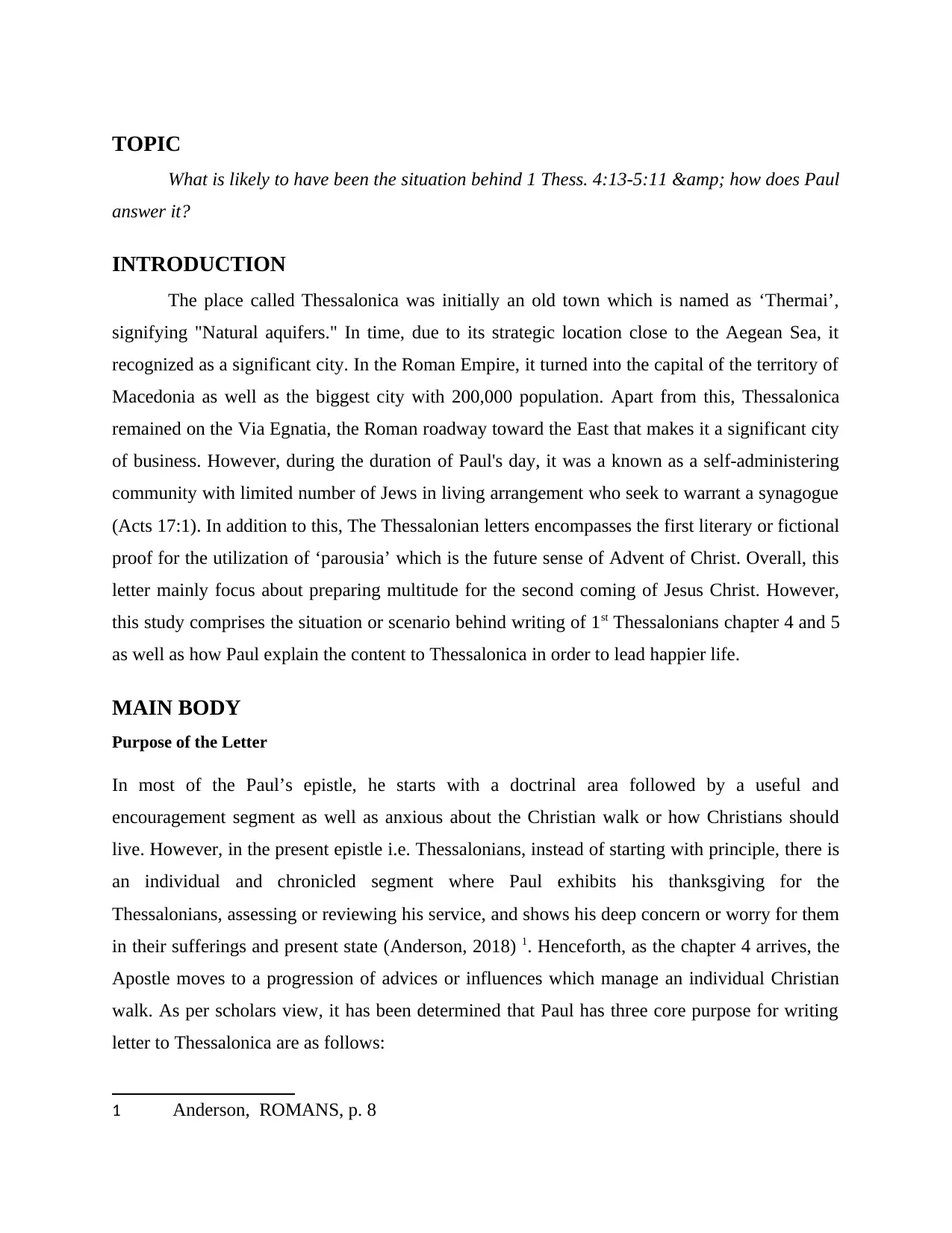
TOPIC
What is likely to have been the situation behind 1 Thess. 4:13-5:11 & how does Paul
answer it?
INTRODUCTION
The place called Thessalonica was initially an old town which is named as ‘Thermai’,
signifying "Natural aquifers." In time, due to its strategic location close to the Aegean Sea, it
recognized as a significant city. In the Roman Empire, it turned into the capital of the territory of
Macedonia as well as the biggest city with 200,000 population. Apart from this, Thessalonica
remained on the Via Egnatia, the Roman roadway toward the East that makes it a significant city
of business. However, during the duration of Paul's day, it was a known as a self-administering
community with limited number of Jews in living arrangement who seek to warrant a synagogue
(Acts 17:1). In addition to this, The Thessalonian letters encompasses the first literary or fictional
proof for the utilization of ‘parousia’ which is the future sense of Advent of Christ. Overall, this
letter mainly focus about preparing multitude for the second coming of Jesus Christ. However,
this study comprises the situation or scenario behind writing of 1st Thessalonians chapter 4 and 5
as well as how Paul explain the content to Thessalonica in order to lead happier life.
MAIN BODY
Purpose of the Letter
In most of the Paul’s epistle, he starts with a doctrinal area followed by a useful and
encouragement segment as well as anxious about the Christian walk or how Christians should
live. However, in the present epistle i.e. Thessalonians, instead of starting with principle, there is
an individual and chronicled segment where Paul exhibits his thanksgiving for the
Thessalonians, assessing or reviewing his service, and shows his deep concern or worry for them
in their sufferings and present state (Anderson, 2018) 1. Henceforth, as the chapter 4 arrives, the
Apostle moves to a progression of advices or influences which manage an individual Christian
walk. As per scholars view, it has been determined that Paul has three core purpose for writing
letter to Thessalonica are as follows:
1 Anderson, ROMANS, p. 8
What is likely to have been the situation behind 1 Thess. 4:13-5:11 & how does Paul
answer it?
INTRODUCTION
The place called Thessalonica was initially an old town which is named as ‘Thermai’,
signifying "Natural aquifers." In time, due to its strategic location close to the Aegean Sea, it
recognized as a significant city. In the Roman Empire, it turned into the capital of the territory of
Macedonia as well as the biggest city with 200,000 population. Apart from this, Thessalonica
remained on the Via Egnatia, the Roman roadway toward the East that makes it a significant city
of business. However, during the duration of Paul's day, it was a known as a self-administering
community with limited number of Jews in living arrangement who seek to warrant a synagogue
(Acts 17:1). In addition to this, The Thessalonian letters encompasses the first literary or fictional
proof for the utilization of ‘parousia’ which is the future sense of Advent of Christ. Overall, this
letter mainly focus about preparing multitude for the second coming of Jesus Christ. However,
this study comprises the situation or scenario behind writing of 1st Thessalonians chapter 4 and 5
as well as how Paul explain the content to Thessalonica in order to lead happier life.
MAIN BODY
Purpose of the Letter
In most of the Paul’s epistle, he starts with a doctrinal area followed by a useful and
encouragement segment as well as anxious about the Christian walk or how Christians should
live. However, in the present epistle i.e. Thessalonians, instead of starting with principle, there is
an individual and chronicled segment where Paul exhibits his thanksgiving for the
Thessalonians, assessing or reviewing his service, and shows his deep concern or worry for them
in their sufferings and present state (Anderson, 2018) 1. Henceforth, as the chapter 4 arrives, the
Apostle moves to a progression of advices or influences which manage an individual Christian
walk. As per scholars view, it has been determined that Paul has three core purpose for writing
letter to Thessalonica are as follows:
1 Anderson, ROMANS, p. 8
⊘ This is a preview!⊘
Do you want full access?
Subscribe today to unlock all pages.

Trusted by 1+ million students worldwide
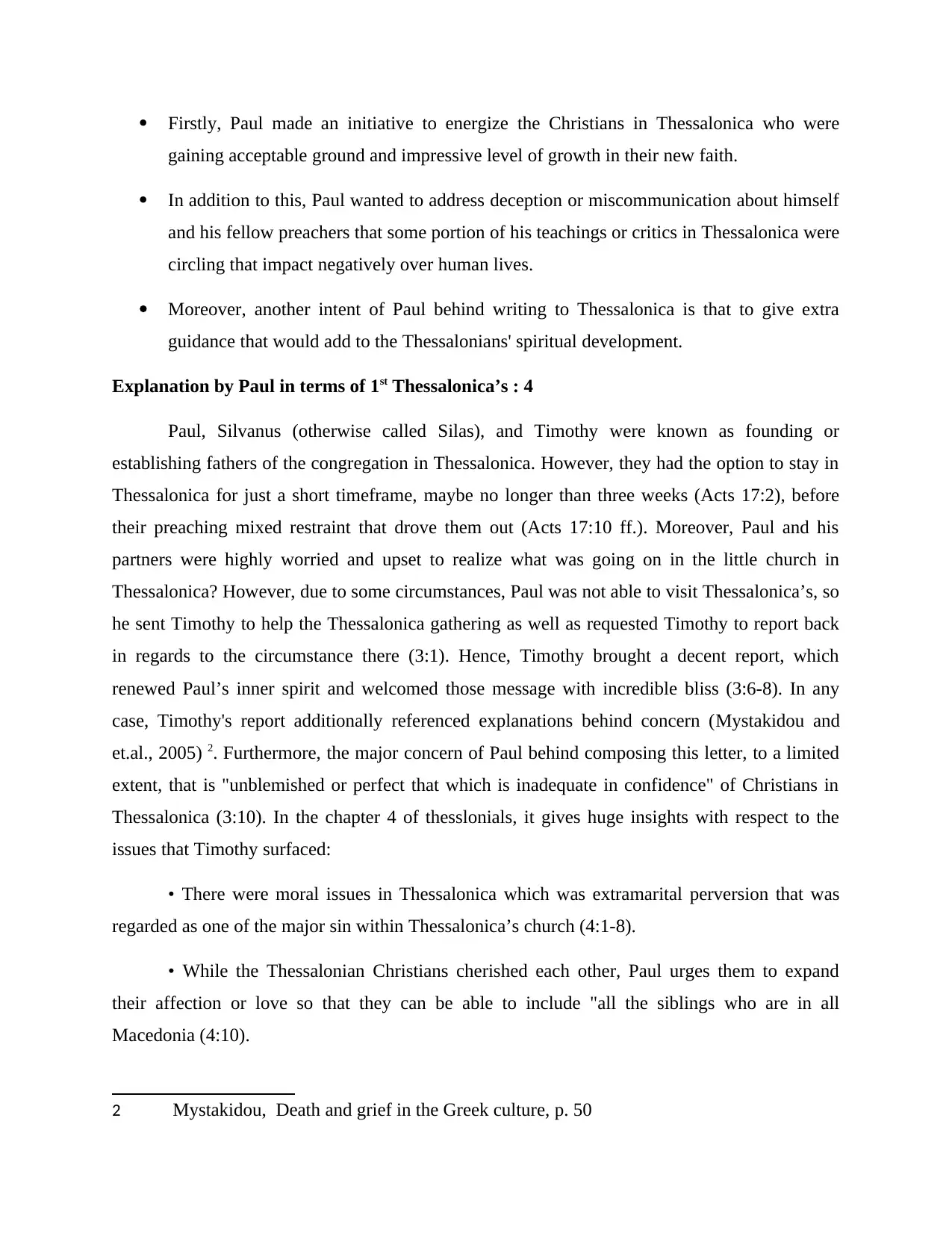
Firstly, Paul made an initiative to energize the Christians in Thessalonica who were
gaining acceptable ground and impressive level of growth in their new faith.
In addition to this, Paul wanted to address deception or miscommunication about himself
and his fellow preachers that some portion of his teachings or critics in Thessalonica were
circling that impact negatively over human lives.
Moreover, another intent of Paul behind writing to Thessalonica is that to give extra
guidance that would add to the Thessalonians' spiritual development.
Explanation by Paul in terms of 1st Thessalonica’s : 4
Paul, Silvanus (otherwise called Silas), and Timothy were known as founding or
establishing fathers of the congregation in Thessalonica. However, they had the option to stay in
Thessalonica for just a short timeframe, maybe no longer than three weeks (Acts 17:2), before
their preaching mixed restraint that drove them out (Acts 17:10 ff.). Moreover, Paul and his
partners were highly worried and upset to realize what was going on in the little church in
Thessalonica? However, due to some circumstances, Paul was not able to visit Thessalonica’s, so
he sent Timothy to help the Thessalonica gathering as well as requested Timothy to report back
in regards to the circumstance there (3:1). Hence, Timothy brought a decent report, which
renewed Paul’s inner spirit and welcomed those message with incredible bliss (3:6-8). In any
case, Timothy's report additionally referenced explanations behind concern (Mystakidou and
et.al., 2005) 2. Furthermore, the major concern of Paul behind composing this letter, to a limited
extent, that is "unblemished or perfect that which is inadequate in confidence" of Christians in
Thessalonica (3:10). In the chapter 4 of thesslonials, it gives huge insights with respect to the
issues that Timothy surfaced:
• There were moral issues in Thessalonica which was extramarital perversion that was
regarded as one of the major sin within Thessalonica’s church (4:1-8).
• While the Thessalonian Christians cherished each other, Paul urges them to expand
their affection or love so that they can be able to include "all the siblings who are in all
Macedonia (4:10).
2 Mystakidou, Death and grief in the Greek culture, p. 50
gaining acceptable ground and impressive level of growth in their new faith.
In addition to this, Paul wanted to address deception or miscommunication about himself
and his fellow preachers that some portion of his teachings or critics in Thessalonica were
circling that impact negatively over human lives.
Moreover, another intent of Paul behind writing to Thessalonica is that to give extra
guidance that would add to the Thessalonians' spiritual development.
Explanation by Paul in terms of 1st Thessalonica’s : 4
Paul, Silvanus (otherwise called Silas), and Timothy were known as founding or
establishing fathers of the congregation in Thessalonica. However, they had the option to stay in
Thessalonica for just a short timeframe, maybe no longer than three weeks (Acts 17:2), before
their preaching mixed restraint that drove them out (Acts 17:10 ff.). Moreover, Paul and his
partners were highly worried and upset to realize what was going on in the little church in
Thessalonica? However, due to some circumstances, Paul was not able to visit Thessalonica’s, so
he sent Timothy to help the Thessalonica gathering as well as requested Timothy to report back
in regards to the circumstance there (3:1). Hence, Timothy brought a decent report, which
renewed Paul’s inner spirit and welcomed those message with incredible bliss (3:6-8). In any
case, Timothy's report additionally referenced explanations behind concern (Mystakidou and
et.al., 2005) 2. Furthermore, the major concern of Paul behind composing this letter, to a limited
extent, that is "unblemished or perfect that which is inadequate in confidence" of Christians in
Thessalonica (3:10). In the chapter 4 of thesslonials, it gives huge insights with respect to the
issues that Timothy surfaced:
• There were moral issues in Thessalonica which was extramarital perversion that was
regarded as one of the major sin within Thessalonica’s church (4:1-8).
• While the Thessalonian Christians cherished each other, Paul urges them to expand
their affection or love so that they can be able to include "all the siblings who are in all
Macedonia (4:10).
2 Mystakidou, Death and grief in the Greek culture, p. 50
Paraphrase This Document
Need a fresh take? Get an instant paraphrase of this document with our AI Paraphraser
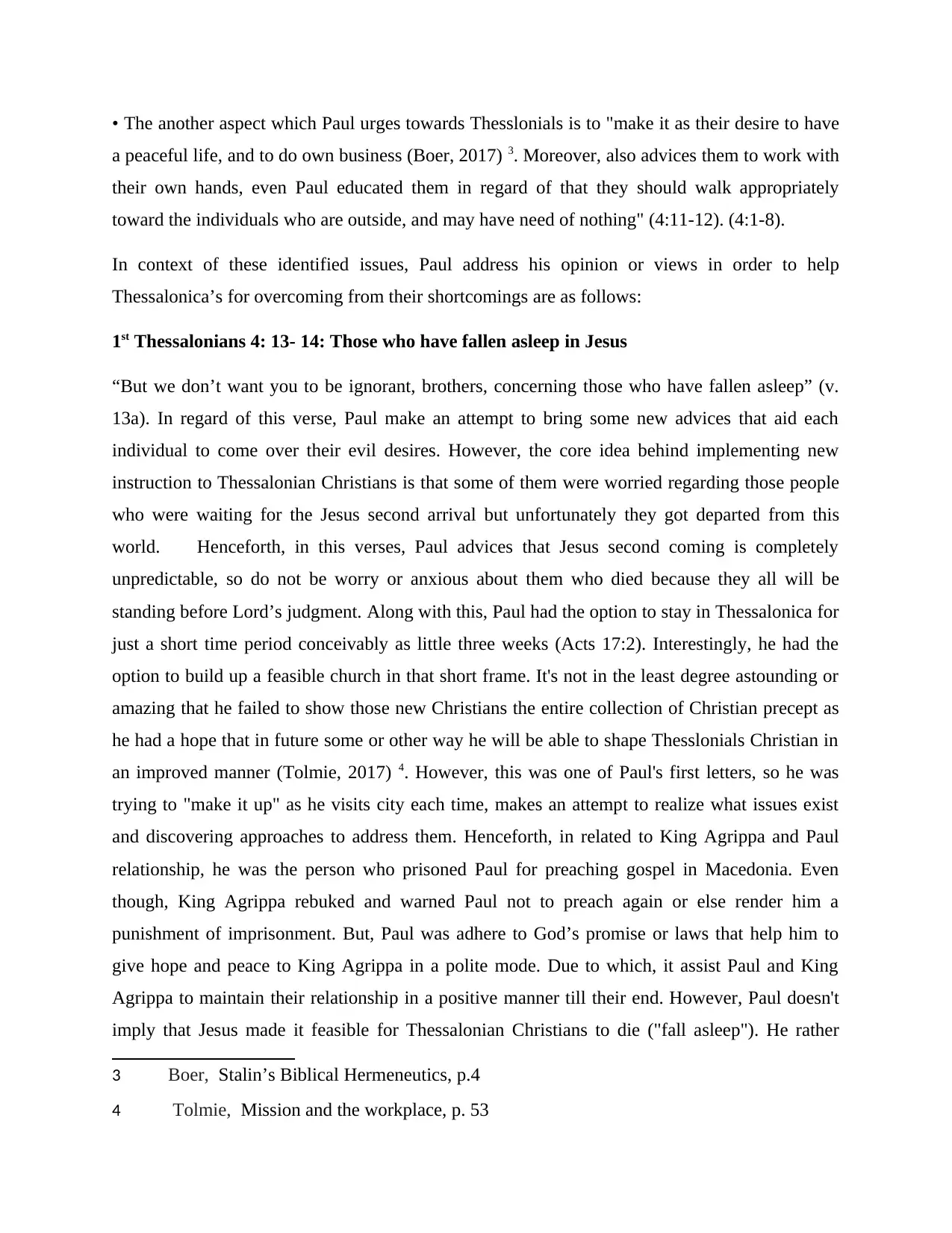
• The another aspect which Paul urges towards Thesslonials is to "make it as their desire to have
a peaceful life, and to do own business (Boer, 2017) 3. Moreover, also advices them to work with
their own hands, even Paul educated them in regard of that they should walk appropriately
toward the individuals who are outside, and may have need of nothing" (4:11-12). (4:1-8).
In context of these identified issues, Paul address his opinion or views in order to help
Thessalonica’s for overcoming from their shortcomings are as follows:
1st Thessalonians 4: 13- 14: Those who have fallen asleep in Jesus
“But we don’t want you to be ignorant, brothers, concerning those who have fallen asleep” (v.
13a). In regard of this verse, Paul make an attempt to bring some new advices that aid each
individual to come over their evil desires. However, the core idea behind implementing new
instruction to Thessalonian Christians is that some of them were worried regarding those people
who were waiting for the Jesus second arrival but unfortunately they got departed from this
world. Henceforth, in this verses, Paul advices that Jesus second coming is completely
unpredictable, so do not be worry or anxious about them who died because they all will be
standing before Lord’s judgment. Along with this, Paul had the option to stay in Thessalonica for
just a short time period conceivably as little three weeks (Acts 17:2). Interestingly, he had the
option to build up a feasible church in that short frame. It's not in the least degree astounding or
amazing that he failed to show those new Christians the entire collection of Christian precept as
he had a hope that in future some or other way he will be able to shape Thesslonials Christian in
an improved manner (Tolmie, 2017) 4. However, this was one of Paul's first letters, so he was
trying to "make it up" as he visits city each time, makes an attempt to realize what issues exist
and discovering approaches to address them. Henceforth, in related to King Agrippa and Paul
relationship, he was the person who prisoned Paul for preaching gospel in Macedonia. Even
though, King Agrippa rebuked and warned Paul not to preach again or else render him a
punishment of imprisonment. But, Paul was adhere to God’s promise or laws that help him to
give hope and peace to King Agrippa in a polite mode. Due to which, it assist Paul and King
Agrippa to maintain their relationship in a positive manner till their end. However, Paul doesn't
imply that Jesus made it feasible for Thessalonian Christians to die ("fall asleep"). He rather
3 Boer, Stalin’s Biblical Hermeneutics, p.4
4 Tolmie, Mission and the workplace, p. 53
a peaceful life, and to do own business (Boer, 2017) 3. Moreover, also advices them to work with
their own hands, even Paul educated them in regard of that they should walk appropriately
toward the individuals who are outside, and may have need of nothing" (4:11-12). (4:1-8).
In context of these identified issues, Paul address his opinion or views in order to help
Thessalonica’s for overcoming from their shortcomings are as follows:
1st Thessalonians 4: 13- 14: Those who have fallen asleep in Jesus
“But we don’t want you to be ignorant, brothers, concerning those who have fallen asleep” (v.
13a). In regard of this verse, Paul make an attempt to bring some new advices that aid each
individual to come over their evil desires. However, the core idea behind implementing new
instruction to Thessalonian Christians is that some of them were worried regarding those people
who were waiting for the Jesus second arrival but unfortunately they got departed from this
world. Henceforth, in this verses, Paul advices that Jesus second coming is completely
unpredictable, so do not be worry or anxious about them who died because they all will be
standing before Lord’s judgment. Along with this, Paul had the option to stay in Thessalonica for
just a short time period conceivably as little three weeks (Acts 17:2). Interestingly, he had the
option to build up a feasible church in that short frame. It's not in the least degree astounding or
amazing that he failed to show those new Christians the entire collection of Christian precept as
he had a hope that in future some or other way he will be able to shape Thesslonials Christian in
an improved manner (Tolmie, 2017) 4. However, this was one of Paul's first letters, so he was
trying to "make it up" as he visits city each time, makes an attempt to realize what issues exist
and discovering approaches to address them. Henceforth, in related to King Agrippa and Paul
relationship, he was the person who prisoned Paul for preaching gospel in Macedonia. Even
though, King Agrippa rebuked and warned Paul not to preach again or else render him a
punishment of imprisonment. But, Paul was adhere to God’s promise or laws that help him to
give hope and peace to King Agrippa in a polite mode. Due to which, it assist Paul and King
Agrippa to maintain their relationship in a positive manner till their end. However, Paul doesn't
imply that Jesus made it feasible for Thessalonian Christians to die ("fall asleep"). He rather
3 Boer, Stalin’s Biblical Hermeneutics, p.4
4 Tolmie, Mission and the workplace, p. 53
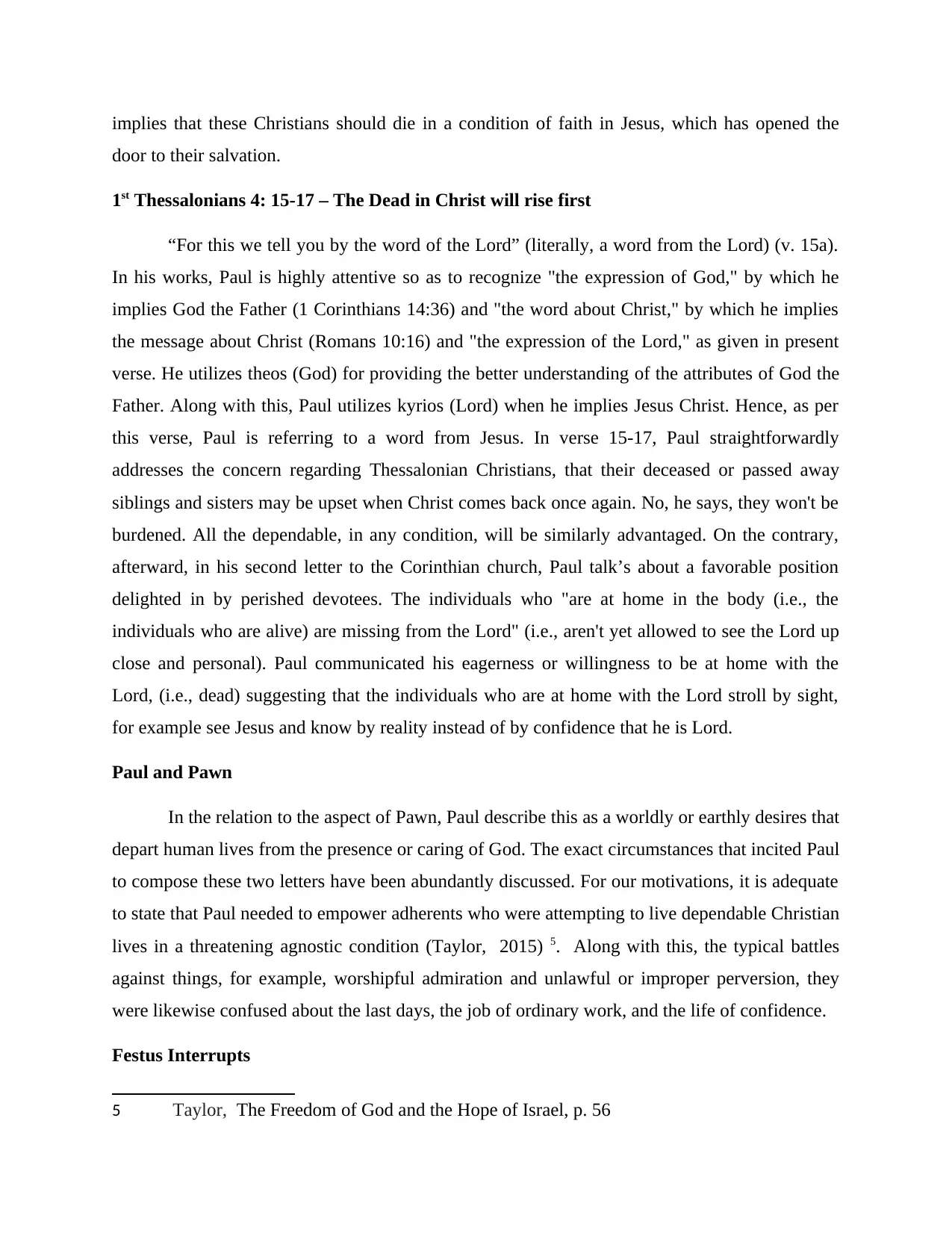
implies that these Christians should die in a condition of faith in Jesus, which has opened the
door to their salvation.
1st Thessalonians 4: 15-17 – The Dead in Christ will rise first
“For this we tell you by the word of the Lord” (literally, a word from the Lord) (v. 15a).
In his works, Paul is highly attentive so as to recognize "the expression of God," by which he
implies God the Father (1 Corinthians 14:36) and "the word about Christ," by which he implies
the message about Christ (Romans 10:16) and "the expression of the Lord," as given in present
verse. He utilizes theos (God) for providing the better understanding of the attributes of God the
Father. Along with this, Paul utilizes kyrios (Lord) when he implies Jesus Christ. Hence, as per
this verse, Paul is referring to a word from Jesus. In verse 15-17, Paul straightforwardly
addresses the concern regarding Thessalonian Christians, that their deceased or passed away
siblings and sisters may be upset when Christ comes back once again. No, he says, they won't be
burdened. All the dependable, in any condition, will be similarly advantaged. On the contrary,
afterward, in his second letter to the Corinthian church, Paul talk’s about a favorable position
delighted in by perished devotees. The individuals who "are at home in the body (i.e., the
individuals who are alive) are missing from the Lord" (i.e., aren't yet allowed to see the Lord up
close and personal). Paul communicated his eagerness or willingness to be at home with the
Lord, (i.e., dead) suggesting that the individuals who are at home with the Lord stroll by sight,
for example see Jesus and know by reality instead of by confidence that he is Lord.
Paul and Pawn
In the relation to the aspect of Pawn, Paul describe this as a worldly or earthly desires that
depart human lives from the presence or caring of God. The exact circumstances that incited Paul
to compose these two letters have been abundantly discussed. For our motivations, it is adequate
to state that Paul needed to empower adherents who were attempting to live dependable Christian
lives in a threatening agnostic condition (Taylor, 2015) 5. Along with this, the typical battles
against things, for example, worshipful admiration and unlawful or improper perversion, they
were likewise confused about the last days, the job of ordinary work, and the life of confidence.
Festus Interrupts
5 Taylor, The Freedom of God and the Hope of Israel, p. 56
door to their salvation.
1st Thessalonians 4: 15-17 – The Dead in Christ will rise first
“For this we tell you by the word of the Lord” (literally, a word from the Lord) (v. 15a).
In his works, Paul is highly attentive so as to recognize "the expression of God," by which he
implies God the Father (1 Corinthians 14:36) and "the word about Christ," by which he implies
the message about Christ (Romans 10:16) and "the expression of the Lord," as given in present
verse. He utilizes theos (God) for providing the better understanding of the attributes of God the
Father. Along with this, Paul utilizes kyrios (Lord) when he implies Jesus Christ. Hence, as per
this verse, Paul is referring to a word from Jesus. In verse 15-17, Paul straightforwardly
addresses the concern regarding Thessalonian Christians, that their deceased or passed away
siblings and sisters may be upset when Christ comes back once again. No, he says, they won't be
burdened. All the dependable, in any condition, will be similarly advantaged. On the contrary,
afterward, in his second letter to the Corinthian church, Paul talk’s about a favorable position
delighted in by perished devotees. The individuals who "are at home in the body (i.e., the
individuals who are alive) are missing from the Lord" (i.e., aren't yet allowed to see the Lord up
close and personal). Paul communicated his eagerness or willingness to be at home with the
Lord, (i.e., dead) suggesting that the individuals who are at home with the Lord stroll by sight,
for example see Jesus and know by reality instead of by confidence that he is Lord.
Paul and Pawn
In the relation to the aspect of Pawn, Paul describe this as a worldly or earthly desires that
depart human lives from the presence or caring of God. The exact circumstances that incited Paul
to compose these two letters have been abundantly discussed. For our motivations, it is adequate
to state that Paul needed to empower adherents who were attempting to live dependable Christian
lives in a threatening agnostic condition (Taylor, 2015) 5. Along with this, the typical battles
against things, for example, worshipful admiration and unlawful or improper perversion, they
were likewise confused about the last days, the job of ordinary work, and the life of confidence.
Festus Interrupts
5 Taylor, The Freedom of God and the Hope of Israel, p. 56
⊘ This is a preview!⊘
Do you want full access?
Subscribe today to unlock all pages.

Trusted by 1+ million students worldwide
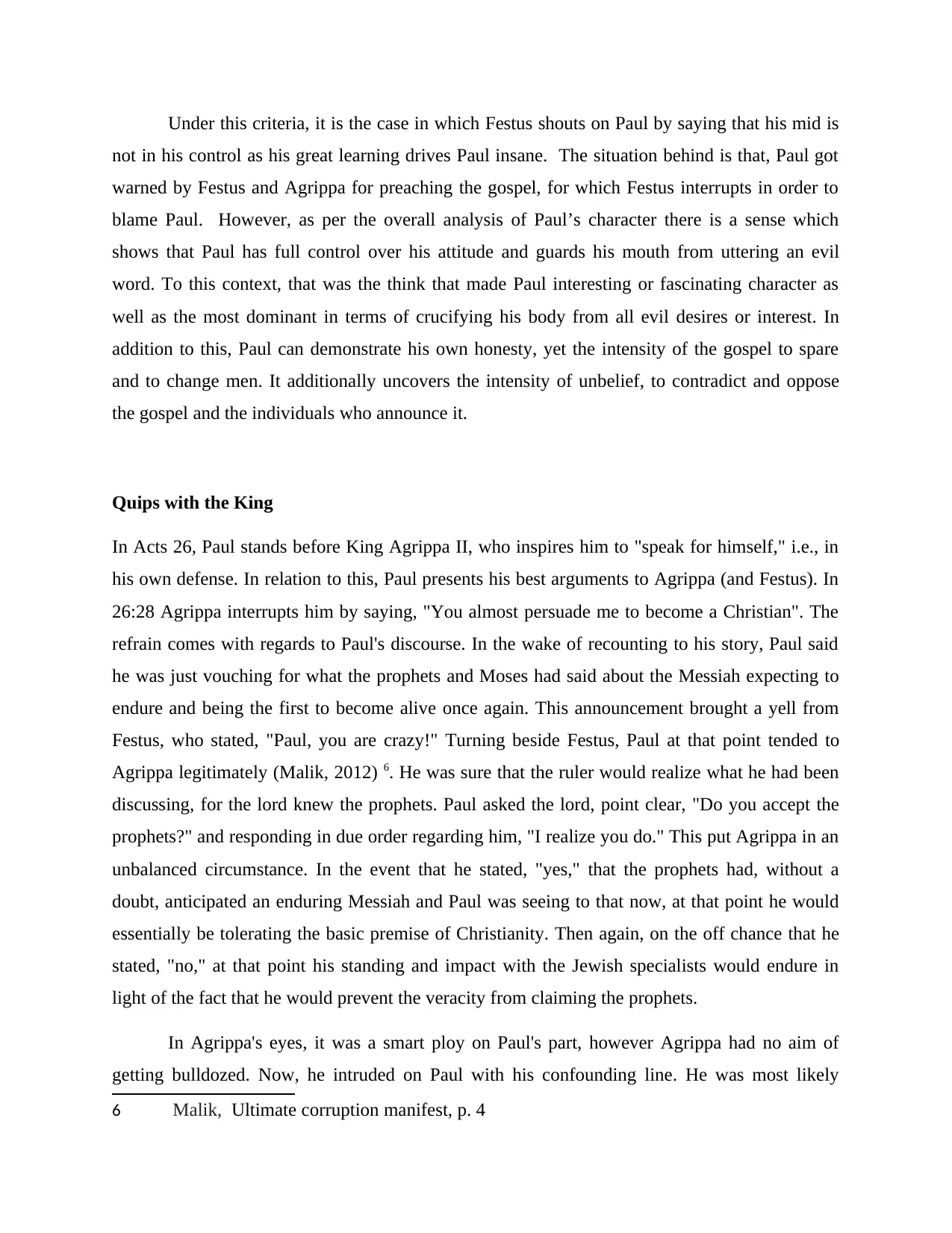
Under this criteria, it is the case in which Festus shouts on Paul by saying that his mid is
not in his control as his great learning drives Paul insane. The situation behind is that, Paul got
warned by Festus and Agrippa for preaching the gospel, for which Festus interrupts in order to
blame Paul. However, as per the overall analysis of Paul’s character there is a sense which
shows that Paul has full control over his attitude and guards his mouth from uttering an evil
word. To this context, that was the think that made Paul interesting or fascinating character as
well as the most dominant in terms of crucifying his body from all evil desires or interest. In
addition to this, Paul can demonstrate his own honesty, yet the intensity of the gospel to spare
and to change men. It additionally uncovers the intensity of unbelief, to contradict and oppose
the gospel and the individuals who announce it.
Quips with the King
In Acts 26, Paul stands before King Agrippa II, who inspires him to "speak for himself," i.e., in
his own defense. In relation to this, Paul presents his best arguments to Agrippa (and Festus). In
26:28 Agrippa interrupts him by saying, "You almost persuade me to become a Christian". The
refrain comes with regards to Paul's discourse. In the wake of recounting to his story, Paul said
he was just vouching for what the prophets and Moses had said about the Messiah expecting to
endure and being the first to become alive once again. This announcement brought a yell from
Festus, who stated, "Paul, you are crazy!" Turning beside Festus, Paul at that point tended to
Agrippa legitimately (Malik, 2012) 6. He was sure that the ruler would realize what he had been
discussing, for the lord knew the prophets. Paul asked the lord, point clear, "Do you accept the
prophets?" and responding in due order regarding him, "I realize you do." This put Agrippa in an
unbalanced circumstance. In the event that he stated, "yes," that the prophets had, without a
doubt, anticipated an enduring Messiah and Paul was seeing to that now, at that point he would
essentially be tolerating the basic premise of Christianity. Then again, on the off chance that he
stated, "no," at that point his standing and impact with the Jewish specialists would endure in
light of the fact that he would prevent the veracity from claiming the prophets.
In Agrippa's eyes, it was a smart ploy on Paul's part, however Agrippa had no aim of
getting bulldozed. Now, he intruded on Paul with his confounding line. He was most likely
6 Malik, Ultimate corruption manifest, p. 4
not in his control as his great learning drives Paul insane. The situation behind is that, Paul got
warned by Festus and Agrippa for preaching the gospel, for which Festus interrupts in order to
blame Paul. However, as per the overall analysis of Paul’s character there is a sense which
shows that Paul has full control over his attitude and guards his mouth from uttering an evil
word. To this context, that was the think that made Paul interesting or fascinating character as
well as the most dominant in terms of crucifying his body from all evil desires or interest. In
addition to this, Paul can demonstrate his own honesty, yet the intensity of the gospel to spare
and to change men. It additionally uncovers the intensity of unbelief, to contradict and oppose
the gospel and the individuals who announce it.
Quips with the King
In Acts 26, Paul stands before King Agrippa II, who inspires him to "speak for himself," i.e., in
his own defense. In relation to this, Paul presents his best arguments to Agrippa (and Festus). In
26:28 Agrippa interrupts him by saying, "You almost persuade me to become a Christian". The
refrain comes with regards to Paul's discourse. In the wake of recounting to his story, Paul said
he was just vouching for what the prophets and Moses had said about the Messiah expecting to
endure and being the first to become alive once again. This announcement brought a yell from
Festus, who stated, "Paul, you are crazy!" Turning beside Festus, Paul at that point tended to
Agrippa legitimately (Malik, 2012) 6. He was sure that the ruler would realize what he had been
discussing, for the lord knew the prophets. Paul asked the lord, point clear, "Do you accept the
prophets?" and responding in due order regarding him, "I realize you do." This put Agrippa in an
unbalanced circumstance. In the event that he stated, "yes," that the prophets had, without a
doubt, anticipated an enduring Messiah and Paul was seeing to that now, at that point he would
essentially be tolerating the basic premise of Christianity. Then again, on the off chance that he
stated, "no," at that point his standing and impact with the Jewish specialists would endure in
light of the fact that he would prevent the veracity from claiming the prophets.
In Agrippa's eyes, it was a smart ploy on Paul's part, however Agrippa had no aim of
getting bulldozed. Now, he intruded on Paul with his confounding line. He was most likely
6 Malik, Ultimate corruption manifest, p. 4
Paraphrase This Document
Need a fresh take? Get an instant paraphrase of this document with our AI Paraphraser
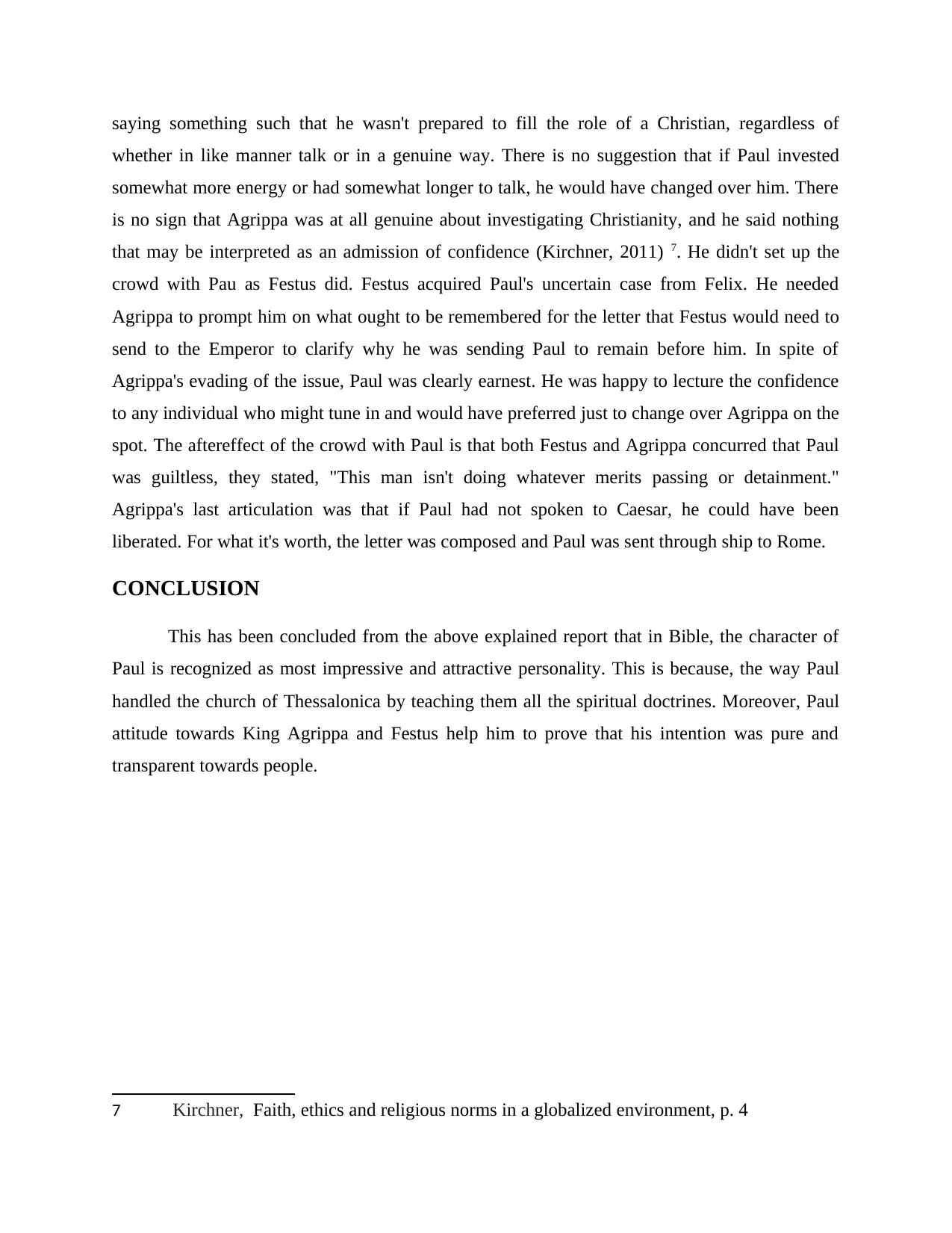
saying something such that he wasn't prepared to fill the role of a Christian, regardless of
whether in like manner talk or in a genuine way. There is no suggestion that if Paul invested
somewhat more energy or had somewhat longer to talk, he would have changed over him. There
is no sign that Agrippa was at all genuine about investigating Christianity, and he said nothing
that may be interpreted as an admission of confidence (Kirchner, 2011) 7. He didn't set up the
crowd with Pau as Festus did. Festus acquired Paul's uncertain case from Felix. He needed
Agrippa to prompt him on what ought to be remembered for the letter that Festus would need to
send to the Emperor to clarify why he was sending Paul to remain before him. In spite of
Agrippa's evading of the issue, Paul was clearly earnest. He was happy to lecture the confidence
to any individual who might tune in and would have preferred just to change over Agrippa on the
spot. The aftereffect of the crowd with Paul is that both Festus and Agrippa concurred that Paul
was guiltless, they stated, "This man isn't doing whatever merits passing or detainment."
Agrippa's last articulation was that if Paul had not spoken to Caesar, he could have been
liberated. For what it's worth, the letter was composed and Paul was sent through ship to Rome.
CONCLUSION
This has been concluded from the above explained report that in Bible, the character of
Paul is recognized as most impressive and attractive personality. This is because, the way Paul
handled the church of Thessalonica by teaching them all the spiritual doctrines. Moreover, Paul
attitude towards King Agrippa and Festus help him to prove that his intention was pure and
transparent towards people.
7 Kirchner, Faith, ethics and religious norms in a globalized environment, p. 4
whether in like manner talk or in a genuine way. There is no suggestion that if Paul invested
somewhat more energy or had somewhat longer to talk, he would have changed over him. There
is no sign that Agrippa was at all genuine about investigating Christianity, and he said nothing
that may be interpreted as an admission of confidence (Kirchner, 2011) 7. He didn't set up the
crowd with Pau as Festus did. Festus acquired Paul's uncertain case from Felix. He needed
Agrippa to prompt him on what ought to be remembered for the letter that Festus would need to
send to the Emperor to clarify why he was sending Paul to remain before him. In spite of
Agrippa's evading of the issue, Paul was clearly earnest. He was happy to lecture the confidence
to any individual who might tune in and would have preferred just to change over Agrippa on the
spot. The aftereffect of the crowd with Paul is that both Festus and Agrippa concurred that Paul
was guiltless, they stated, "This man isn't doing whatever merits passing or detainment."
Agrippa's last articulation was that if Paul had not spoken to Caesar, he could have been
liberated. For what it's worth, the letter was composed and Paul was sent through ship to Rome.
CONCLUSION
This has been concluded from the above explained report that in Bible, the character of
Paul is recognized as most impressive and attractive personality. This is because, the way Paul
handled the church of Thessalonica by teaching them all the spiritual doctrines. Moreover, Paul
attitude towards King Agrippa and Festus help him to prove that his intention was pure and
transparent towards people.
7 Kirchner, Faith, ethics and religious norms in a globalized environment, p. 4
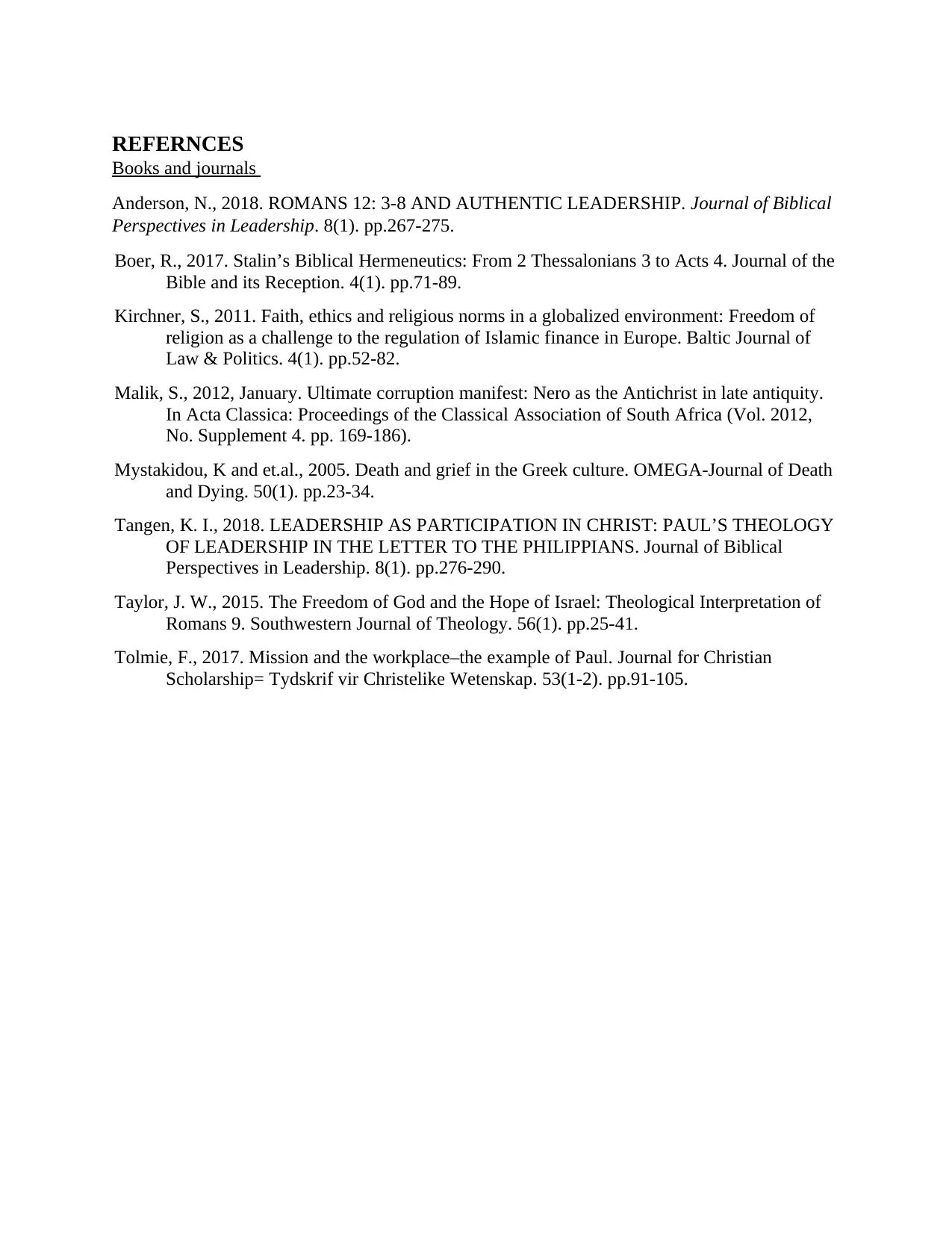
REFERNCES
Books and journals
Anderson, N., 2018. ROMANS 12: 3-8 AND AUTHENTIC LEADERSHIP. Journal of Biblical
Perspectives in Leadership. 8(1). pp.267-275.
Boer, R., 2017. Stalin’s Biblical Hermeneutics: From 2 Thessalonians 3 to Acts 4. Journal of the
Bible and its Reception. 4(1). pp.71-89.
Kirchner, S., 2011. Faith, ethics and religious norms in a globalized environment: Freedom of
religion as a challenge to the regulation of Islamic finance in Europe. Baltic Journal of
Law & Politics. 4(1). pp.52-82.
Malik, S., 2012, January. Ultimate corruption manifest: Nero as the Antichrist in late antiquity.
In Acta Classica: Proceedings of the Classical Association of South Africa (Vol. 2012,
No. Supplement 4. pp. 169-186).
Mystakidou, K and et.al., 2005. Death and grief in the Greek culture. OMEGA-Journal of Death
and Dying. 50(1). pp.23-34.
Tangen, K. I., 2018. LEADERSHIP AS PARTICIPATION IN CHRIST: PAUL’S THEOLOGY
OF LEADERSHIP IN THE LETTER TO THE PHILIPPIANS. Journal of Biblical
Perspectives in Leadership. 8(1). pp.276-290.
Taylor, J. W., 2015. The Freedom of God and the Hope of Israel: Theological Interpretation of
Romans 9. Southwestern Journal of Theology. 56(1). pp.25-41.
Tolmie, F., 2017. Mission and the workplace–the example of Paul. Journal for Christian
Scholarship= Tydskrif vir Christelike Wetenskap. 53(1-2). pp.91-105.
Books and journals
Anderson, N., 2018. ROMANS 12: 3-8 AND AUTHENTIC LEADERSHIP. Journal of Biblical
Perspectives in Leadership. 8(1). pp.267-275.
Boer, R., 2017. Stalin’s Biblical Hermeneutics: From 2 Thessalonians 3 to Acts 4. Journal of the
Bible and its Reception. 4(1). pp.71-89.
Kirchner, S., 2011. Faith, ethics and religious norms in a globalized environment: Freedom of
religion as a challenge to the regulation of Islamic finance in Europe. Baltic Journal of
Law & Politics. 4(1). pp.52-82.
Malik, S., 2012, January. Ultimate corruption manifest: Nero as the Antichrist in late antiquity.
In Acta Classica: Proceedings of the Classical Association of South Africa (Vol. 2012,
No. Supplement 4. pp. 169-186).
Mystakidou, K and et.al., 2005. Death and grief in the Greek culture. OMEGA-Journal of Death
and Dying. 50(1). pp.23-34.
Tangen, K. I., 2018. LEADERSHIP AS PARTICIPATION IN CHRIST: PAUL’S THEOLOGY
OF LEADERSHIP IN THE LETTER TO THE PHILIPPIANS. Journal of Biblical
Perspectives in Leadership. 8(1). pp.276-290.
Taylor, J. W., 2015. The Freedom of God and the Hope of Israel: Theological Interpretation of
Romans 9. Southwestern Journal of Theology. 56(1). pp.25-41.
Tolmie, F., 2017. Mission and the workplace–the example of Paul. Journal for Christian
Scholarship= Tydskrif vir Christelike Wetenskap. 53(1-2). pp.91-105.
⊘ This is a preview!⊘
Do you want full access?
Subscribe today to unlock all pages.

Trusted by 1+ million students worldwide
1 out of 9
Related Documents
Your All-in-One AI-Powered Toolkit for Academic Success.
+13062052269
info@desklib.com
Available 24*7 on WhatsApp / Email
![[object Object]](/_next/static/media/star-bottom.7253800d.svg)
Unlock your academic potential
Copyright © 2020–2026 A2Z Services. All Rights Reserved. Developed and managed by ZUCOL.





